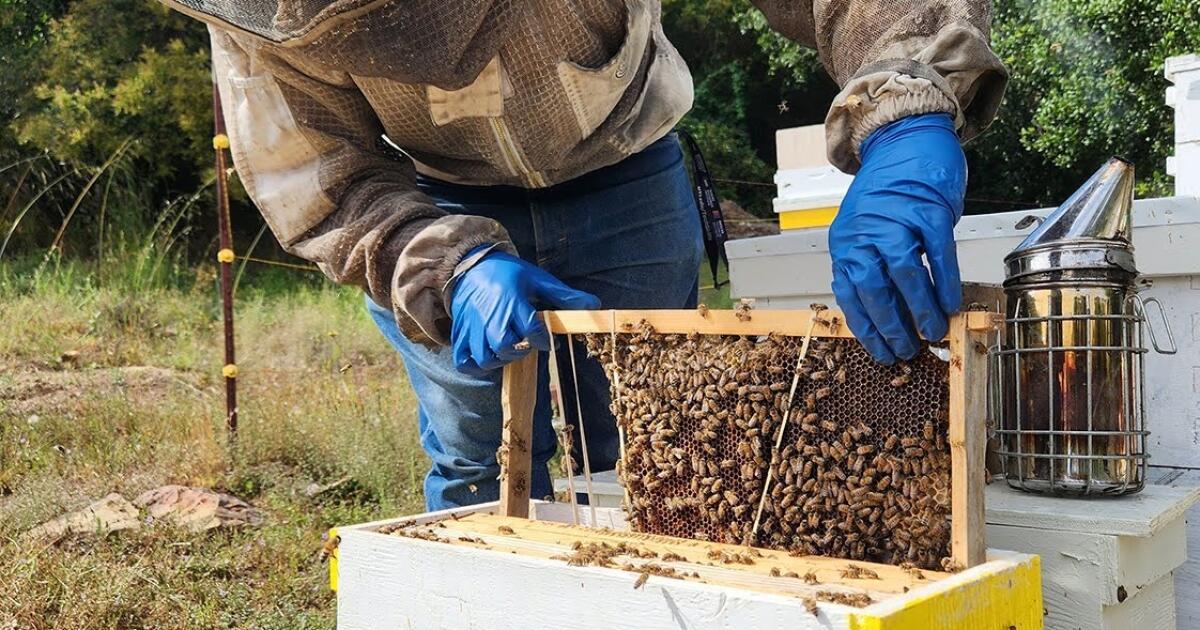
The morning the mountain fire broke out, wind gusts were so strong in Somis that several of the sturdy wooden boxes that housed Eduardo Flores’ bee colonies had already been toppled.
Flores was watching his security camera footage from home and was preparing to arrive in his truck when he received a message from his brother-in-law: There was a fire near the apiary.
Within an hour, all 150 boxes had been destroyed by the fire and millions of bees had died.
“All we could do was observe,” said Flores, owner of Ventura Bee Rescue, a business that removes bothersome bees from homes, rehabilitates colonies, then relocates pollinators to help maintain bee populations. local bees.

Ventura Bee Rescue’s main apiary in Somis is seen before it was destroyed by the Mountain Fire.
(Ventura Bee Rescue)
Each box in the Somis apiary contained a single hive with 40,000 to 80,000 bees, including a queen, or almost half of its entire activity.
“The loss was very sudden, it happened very quickly, especially because we are very close to where the fire started,” Flores said. He still wonders if he could have done anything to save the insects. “When I try to describe it to people, I say we tried, but it was just impossible.”
The devastating Mountain Fire, which is currently approximately 82% contained, has destroyed more than 240 structures across its 20,630 acres; An additional 125 structures were damaged.
The western bees of Flores, Apis melliferastayed on the Somis farm for the winter, feeding on the nearby pepper and eucalyptus trees to help them get through the winter. The 150 hives that burned represented more than half of the company’s colonies, each worth between $400 and $500 in equipment alone. In total, Flores estimates the fire cost him more than $35,000. “It sets us back, because it reflects a few years of work.”
Flores is a former software engineer who once worked with bees as a hobby. He and his wife – a biochemist – developed a passion for bees and decided to start their business, bringing rescued hives to small farms in the area to help pollinate their crops and selling raw honey locally. “The more you learn about bees, the more you appreciate them,” he said.

Eduardo Flores, owner of Ventura Bee Rescue, talks about bees at the EP Foster Library in Ventura.
(Ventura Bee Rescue
)
Bees play a crucial role in pollinating native plants and crops, but their populations are declining worldwide. Since 2007, some bee populations have fallen by more than 80 percent, according to a study by the U.S. Forest Service, part of the U.S. Department of Agriculture.
Flores quickly became an advocate for bees, visiting local schools, libraries and museums to educate children about the importance of bees and sharing his love for these often feared creatures. Every spring, he brought white boxes to an event called Pollinator Palooza in Ventura, where children painted them bright colors.
Flores said he plans to rebuild his lost boxes and quickly restore the colonies. “They’re not going to stop and we can’t stop either.”
Flores created a GoFundMe account, where he has already raised more than $5,000 to purchase new equipment.
But he added that the uniqueness of the Somis apiary will be much harder to replace.
“You could see the colors there. “It’s something we’re going to miss,” he said, remembering the boxes covered with children’s drawings and messages in rainbow colors.
“That’s what really hurts, to see it all go up in flames. Until the camera gave out.


